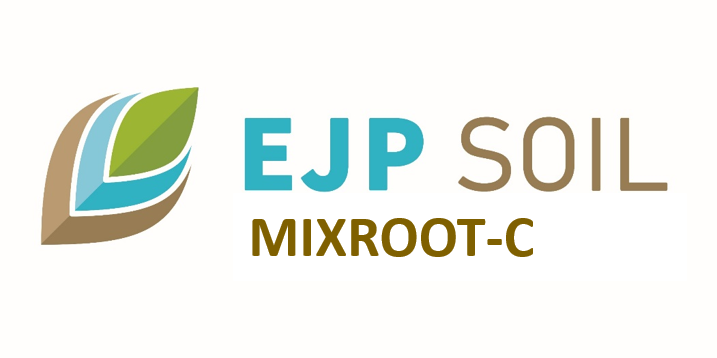MIXROOT-C
| Start: | 1 November 2021 |
| Duration: | 36 Months |
| Aim: | to measure in situ root carbon (C) production and to propose root traits related to soil organic C storage in topsoil and subsoil in the context of diversified agrosystems in Europe |
| Keywords: | Diversified agroecosystems; roots, carbon, subsoil, perennials, annuals |
| Contact: | Project coordinator: Isabelle Bertrand, INRAE (isabelle.bertrand@inrae.fr) Project communication representative: Eric Mignard, INRAE (eric.mignard@inrae.fr) |

Background
In order to achieve climate neutrality by 2050 (European Green Deal ambition) we will need the use of maximum potential of soils for mitigation and adaptation strategies (Montanarella and Panagos, 2021). Since the 4 per mille initiative was launched, a diversity of cropping systems and management practices have been evaluated for their contribution to C sequestration. Because soil organic matter is a major component of soil fertility, soil quality and resilience, increasing SOC storage would also contribute to climate change mitigation and other ecosystem services (reducing erosion, biodiversity, water storage).
The overarching aim of the MIXROOT-C project is to:
Gain a management-oriented understanding of the effect of mixed-species root systems on carbon flow and organic matter accumulation in European agricultural soils. The corresponding operational objective is to analyse root processes in mix-species systems and to quantify in situ root C production and to propose root traits related to soil organic C storage in topsoil and subsoil for most cropping system diversification in European agriculture.
This project accounts for the interactions between climate, soil type, above and belowground plant parts and SOC. To address this objective, we will identify the main tradeoffs between increasing plant diversity and root-derived C storage in soils
The aim of MIXROOT-C seeks to fill this gap in mixed species systems (i.e. grassland, agroforestry, intercropping) in complement to the twin MaxRoot-C project which focused on main “cash” crops and cover crops.
Figure 1: Aims and targets of the twin projects MaxRooT-C and MIXROOT-C
Articles about results from MIXROOT-C
- Layla M. San-Emeterio, Lorena M. Zavala, Nicasio T. Jiménez-Morillo, Ignacio M. Pérez-Ramos, and José A. González-Pérez. Effects of Climate Change on Soil Organic Matter C and H Isotope Composition in a Mediterranean Savannah (Dehesa): An Assessment Using Py-CSIA. 2023. Environmental Science & Technology 2023 57 (37), 13851-13862.
